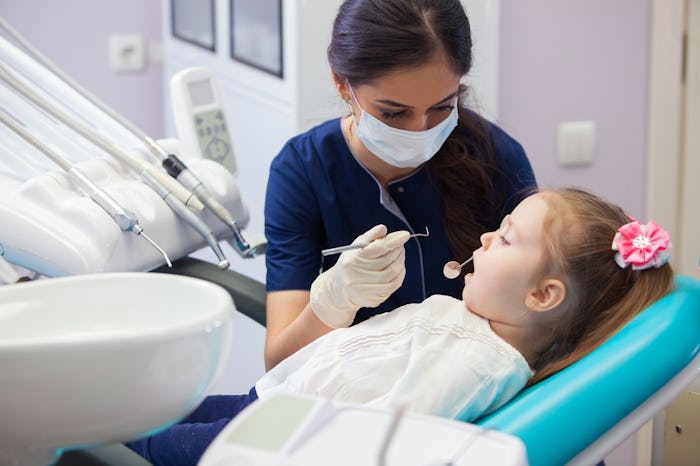When your baby is just starting to cut those first couple of teeth, you may be so charmed by this important milestone (or, more likely, you're too tired from all those weeks of gnawing, drooling, and fussing) that it may not occur to you to set up your toddler's first appointment with a dentist. However, dental health is just as important as keeping the rest of your child's body healthy, so it's vital to know the current recommendations on checkups and other tooth-related issues.
Though it may seem logical to take your child for a first dental visit once all their teeth are in, the American Dental Association actually recommended that a child see the dentist before their first birthday, or within 6 months of the first tooth, since cavities can form even when a child is still an infant.
Despite that recommendation, many families put off that all-important visit. One study commissioned by Delta Dental Plans Association found that a surprising 34 percent of parents had never taken their children to the dentist. Why? The most commonly cited reason was that parents believed their little ones were too young or didn't have enough teeth yet to make it worthwhile.
On the contrary, an early visit can catch dental problems before they become serious. The dentist will check your baby to make sure the mouth and teeth are developing normally, show you how to clean those precious first chompers, and address any concerns you have, such as thumb-sucking, diet, and habits that can lead to poor dental health. For example, the ADA cited "baby bottle tooth decay" as a primary cause of cavities. When a toddler goes to bed with a bottle of milk, juice or a sweetened drink, the sugar can remain in the child's mouth overnight, eroding holes in tooth enamel.
Once your child has had that initial visit, you can begin regular twice-yearly dentist visits after all her baby teeth have come in (typically between ages two-and-a-half and three). Even though those teeth will eventually fall out, it's still crucial to have them examined and cleaned regularly, explained dental experts at WebMD. Decayed baby teeth can spread bacteria throughout the mouth, potentially leading to serious infections or damaged adult teeth. Seeing a dentist twice a year will help keep your child's teeth strong and healthy, as well as allowing the doctor to monitor mouth and jaw development. Of course, you should always take your child to the dentist in case of emergency, such as tooth pain or injury.
The ADA and other dental professionals offered these recommendations to help make the most of your toddler's dentist visit:
- Find a pediatric dentist. Just as a pediatrician is best qualified to treat medical conditions in children, a pediatric dentist has been specially trained to care for children's teeth and spot any signs of trouble, according to the American Academy of Pediatrics. Pediatric dentists are also more skilled at calming fearful tots and getting them ready for a proper exam. (Your own dentist may be terrific, but she probably doesn't have stuffed animals to hold or a bubble-gum-flavored fluoride sealant to keep cavities at bay.)
- Prepare your child in advance. Talk to your child about what to expect, and practice toothbrushing and "opening wide." Delta Dental's web page for kids has games and printable coloring pages to help make young patients more comfortable about visiting the dentist.
- Watch your language. The Pediatric Dental Associates of Bend, Oregon, cautioned that using words such as "drill" and "needle" may frighten young children. Be reassuring and explain that the dentist is there to help teeth stay strong.
- Practice good dental habits at home. Your children's dentist visits will be much more pleasant if their teeth are healthy. The American Academy of Pediatric Dentistry recommended tips such as brushing your child's teeth at least twice a day, particularly at bedtime, flossing when at least two teeth are touching each other, and limiting snacks and juices, If your child is still sucking his thumb by age three or older, talk to your dentist about tips to help stop the habit, which can affect mouth and tooth development.
Introducing your toddler to the dentist now will help set the stage for successful visits in the future, and the habits you instill at home will help ensure that those checkups will be happy ones.
